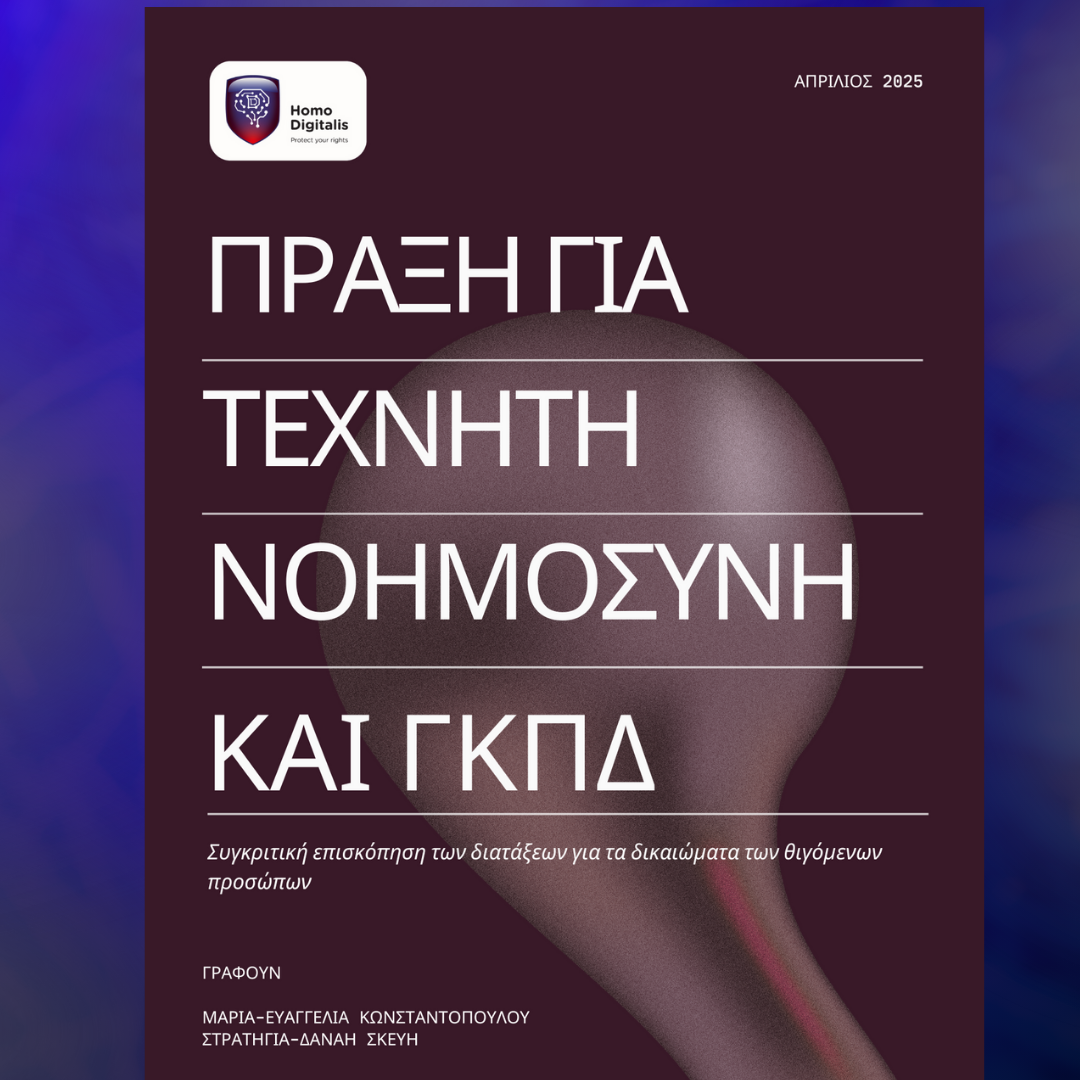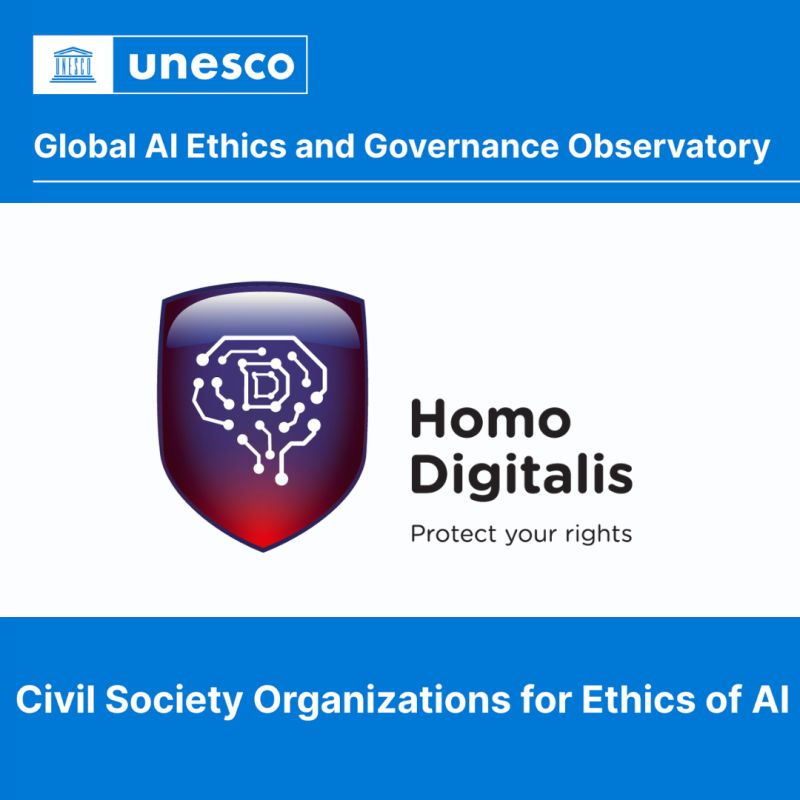Homo Digitalis at TEDx Patras
TEDxPatras returns for its 10th anniversary edition, bringing to the forefront powerful ideas, innovative approaches, and experiences that reshape the way we view the future, under the theme “Once Upon Tomorrow.”
On Saturday, May 17, 2025, the Conference and Cultural Center of the University of Patras will host the largest TEDxPatras event to date, featuring a unique program that includes renowned speakers, interactive workshops, networking hubs, and original experiences for all participants.
Homo Digitalis is proud to participate in this year’s event as a Community Partner, and we are excited to be hosting a dedicated workshop presenting the mission of NGI TALER!
The goal of the workshop is to explain the challenges in digital payments and the solutions offered by the NGI TALER payment tool, as well as to highlight funding opportunities available through the NGI – Next Generation Internet programs.
Our representatives at the event will be Eleftherios Chelioudakis and Alexandra Giannopoulou.
We warmly thank the organizing team for the kind invitation and the great collaboration!
Book your ticket here.
More information about the workshop available here.
We publish our 4th Study on the AI ACT – Comparative overview of the provisions on the rights of affected individuals
Today, April 11, 2025, Homo Digitalis publishes its fourth study on the provisions of Regulation 2024/1689 on Artificial Intelligence (AI), widely known as the AI Act.
This study focuses on the right to explanation and the right of individuals not to be subject to automated decision-making.
Specifically, the use of artificial intelligence systems for making automated decisions is continuously expanding in both the public and private sectors, with significant impacts on the individuals subjected to them.
Therefore, this study examines the legal remedies available to individuals affected by decisions made through the use of AI. The analysis focuses on the right to an explanation of individual decision-making as provided in Article 86 of Regulation 2024/1689. However, since the protection of affected individuals is not limited solely to these provisions, the analysis extends to the right to contest individual decision-making, which—under appropriate interpretation—is based on Article 22 of Regulation 2016/679, known as the GDPR.
The study’s authors are two distinguished legal professionals and volunteer members of Homo Digitalis: Maria-Evangelia Konstantopoulou and Stratygia-Danai Skevi (listed alphabetically).
You can read our 4th study here.
We remind you that we have published three previous studies on Regulation 2024/1689 and its transposition into the Greek legal order: in October (impact assessment on fundamental rights), November (AI governance and competent supervisory authorities), and December (prohibited practices) of 2024, respectively.
This intensive effort aims to contribute constructively to the public dialogue in Greece and at the EU level in the field of artificial intelligence, and it is the result of significant support from the European Artificial Intelligence & Society Fund.
We successfully participated at the panel "AI, Ethics & Family" at the event organized by the Leonteios School Network
Another proud moment! Our co-founder Stefanos Vitoratos and partner at Digital Law Experts (DLE) participated earlier the previous week, in the LeonteiosAI- Shaping the world of education Conference held at the iconic Acropolis Museum, as a Leonteios School Athens alumni and a member of the LeonteiosAI Committee!
Stefanos has contributed to the initiative on adopting AI as part of the school’s educational procedure. Heartfelt thanks to the organizers and committee members for assembling such an inspiring and forward-thinking group of professionals.
We Submitted a Request to the Hellenic Data Protection Authority (HDPA) to Investigate the Programmatic Agreement Between the Ministry of Health and the Company Real Genix and the NGO Beginnings - Newborn Sequencing Initiative
On Friday, April 11, the newspaper Efimerida ton Syntakton and the network Reporters United revealed the programmatic agreement between the Ministry of Health and the company Real Genix along with the NGO Beginnings – Newborn Sequencing Initiative.
The agreement concerns the privatization of neonatal screening and involves the processing of special categories of personal data, specifically genetic data.
Based on the content of the programmatic agreement, there appears to be insufficient reference to compliance with data protection legislation. The roles of the involved parties are not clearly defined, and there is no information provided to inspire public trust regarding the seriousness with which research projects involving special categories of personal data should be handled.
For this reason, on April 14, we submitted a request before the Hellenic Data Protection Authority (HDPA) to investigate the matter, as significant challenges arise regarding the protection of sensitive personal data under this agreement. You can read our full submission here.
Furthermore, following our request to the Data Protection Authority, on April 15, we sent an electronic letter to the DPO (Data Protection Officer) of the Ministry of Health, in which we call on him to:
A) Inform us of the actions taken in the context of their duties as DPO of the Ministry of Health, specifically regarding this programmatic agreement:
Let us know whether they have issued guidance or provided information to the Minister of Health or other relevant departments of the Ministry concerning this agreement;
Inform us whether they have provided advice regarding the need for a Data Protection Impact Assessment (DPIA) in relation to this project, either to the Minister or other competent services within the Ministry;
Inform us whether they have contacted the HDPA about this programmatic agreement and the associated project.
Additionally, if the DPO has issued any written guidance or communications to the Minister or other Ministry departments in relation to points A1 and A2, we respectfully request access to these documents, in accordance with our right as Greek citizens to access public records, as defined in Article 5(5) of the Code of Administrative Procedure (Law 2690/1999, A’ 45), as currently in force, taking into account the relevant Ministerial Decision of the Minister of the Interior (No. 21797/31-12-2024).
We look forward to receiving the relevant responses.
We Are Featured in the HIGGS Newsletter
The new issue of HIGGS’ Civil Society Updates has just been published! The 19th edition of the magazine is out, themed “International Funding“.
Inside, you’ll find an article by Homo Digitalis, represented by our Co-Founder and Executive Director Eleftherios Chelioudakis, titled: “European Funding Opportunities for Human Rights-Oriented Digital Technologies”.
In this article, we highlight key funding opportunities available for the promotion and protection of Human Rights in the context of new technologies, offered by internationally recognized institutions such as the European AI & Society Fund, the Digital Freedom Fund, and the European Commission through the NGI – Next Generation Internet program.
In fact, funding applications for the NGI TALER project, in which we are a partner, are currently open, with a submission deadline of June 1, 2025!
If you’re interested in securing sustainable funding and strategies that contribute to the long-term viability of the ecosystem, follow this link to learn more!
We warmly thank the HIGGS team for the opportunity to contribute to this new issue of Civil Society Updates!
Through our participation in the Accelerator program, we’ve gained valuable insights, knowledge, and guidance on a range of complex issues!
Homo Digitalis is member of UNESCO's Global AI Ethics & Governance Observatory
We are very pleased to announce that Homo Digitalis has been selected as a member of UNESCO’s Global AI Ethics & Governance Observatory!
Homo Digitalis is the only member of the network from Greece, once again highlighting our strong expertise and experience on these issues since the very first months of our founding, back in 2018!
You can learn more about the organizations participating in the network and its activities here.
Homo Digitalis participates in the panel "AI, Ethics & Family" at the Artificial Intelligence event of the Leonteios School Network
Homo Digitalis is delighted to take part in the panel “AI, Ethics & Family” during the event organized by the Leonteios School Network, titled “LeonteiosAI – Shaping the Future of Learning.”
Stefanos Vitoratos, Co-Founder of Homo Digitalis and Partner at the law firm Digital Law Experts (DLE), is representing us at the event.
Our fellow panelists include representatives from key institutions, including the Minister of Social Cohesion and Family, Ms. Domna Michailidou.
The event will take place at the Acropolis Museum (Amphitheater “Dimitrios Pandermalis”) on April 8, 2025.
Successful Awareness-Raising Activities in Larissa during February – March
A series of important awareness-raising activities were successfully carried out in Larissa during the February–March period. Our member, Tasos Arampatzis, represented Homo Digitalis with great success by voluntarily leading several awareness and educational initiatives in the region.
In particular, in collaboration with Frosso Ktistaki — PhD holder and piano professor — they delivered an educational presentation on the theme Cybersecurity, Music, and Human Emotions. Within this context, they discussed the human factor in cybersecurity, the impact of personal data breaches, and how music can serve as a helpful tool. The event took place at Pyrgetos High School on February 24.
Additionally, at the end of March, Tasos represented Homo Digitalis in presentations to 5th and 6th grade students of two co-located primary schools in Larissa — the 15th and 43rd Primary Schools. The topic of the presentations was cyberbullying.








